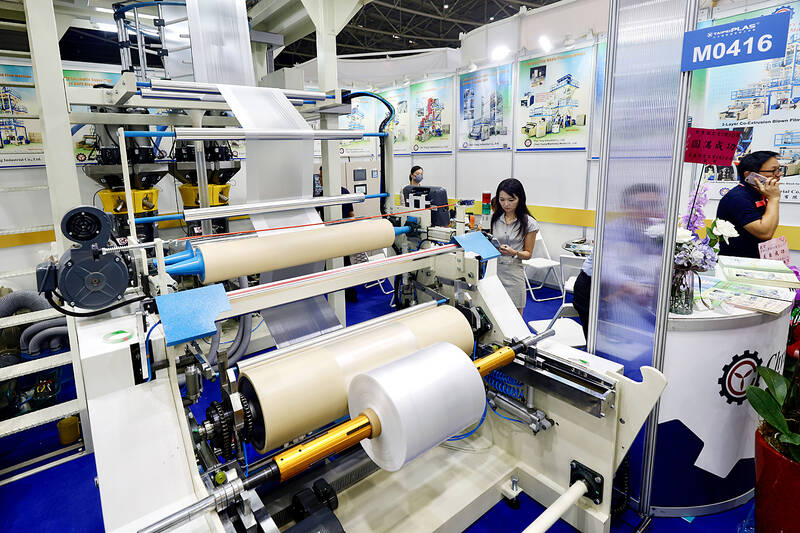Taiwan’s official manufacturing purchasing managers’ index (PMI) last month lost 0.6 points to 50.8, as some firms saw an increase in rush orders, but overall visibility remained foggy, the Chung-Hua Institution for Economic Research (CIER, 中華經濟研究院) said yesterday.
“The end-market demand proved murky though December is usually the high sales season for technology products,” CIER president Lien Hsien-ming (連賢明) said.
Firms generally stood by a wait-and-see attitude before US president-elect Donald Trump is inaugurated on Jan. 20 and makes clear his trade policy, Lien said.

Photo: RITCHIE B. TONGO, EPA-EFE
PMI data seek to capture the health of the manufacturing industry with points of more than 50 indicate expansion and values below 50 suggest contraction.
The reading on new orders shed 4.6 points to 50.9, as business picked up at most sectors except firms that provide chemical and biotechnology products as well as raw materials, the institute said.
CIER researcher Chen Shin-hui (陳馨蕙) said suppliers of consumer electronics benefitted from rush orders, but noted that rush orders were not broad-based — limited mostly to laptop manufacturers for the US market.
Orders for transportation tools also elevated, but the advance likely had to do with seasonal inventory replenishment rather than a market recovery, Chen said.
Despite the advent of the Lunar New Year, firms remained cautious on concerns of Trump’s tariff policy and China’s stimulus measures, she said.
The measure on inventories fell 1.2 points to 47.4, and the reading on customer inventory held unchanged at 44.5, suggesting conservative practices, the institute said. The gauge on industrial output dropped 2.4 points to 52.1, but the sub-index on employment gained 1.2 points to 51.1, it said.
Firms are also dejected about their business prospects, given that the six-month outlook printed 46.1, down 1.8 points from one month earlier, the institute said.
“Jitters about tariff hikes prevail though the artificial intelligence boom would sustain and benefit Taiwanese firms,” Lien said.
In related developments, the non-manufacturing index last month grew 1.9 points to 56.5, as the gaming industry saw sales improve on the beginning of the winter vacation for universities and colleges, the hospitality facilities received support from year-end parties thrown by companies, and shipping firms benefited from higher freight rates on the back of rerouting needs, the institute said.
Most service providers expect business to thrive over the next six months, although retailers and real-estate brokers disagreed, as the holiday season would soon be over and Taiwanese like to spend money abroad, it said.

Intel Corp chief executive officer Lip-Bu Tan (陳立武) is expected to meet with Taiwanese suppliers next month in conjunction with the opening of the Computex Taipei trade show, supply chain sources said on Monday. The visit, the first for Tan to Taiwan since assuming his new post last month, would be aimed at enhancing Intel’s ties with suppliers in Taiwan as he attempts to help turn around the struggling US chipmaker, the sources said. Tan is to hold a banquet to celebrate Intel’s 40-year presence in Taiwan before Computex opens on May 20 and invite dozens of Taiwanese suppliers to exchange views

Application-specific integrated circuit designer Faraday Technology Corp (智原) yesterday said that although revenue this quarter would decline 30 percent from last quarter, it retained its full-year forecast of revenue growth of 100 percent. The company attributed the quarterly drop to a slowdown in customers’ production of chips using Faraday’s advanced packaging technology. The company is still confident about its revenue growth this year, given its strong “design-win” — or the projects it won to help customers design their chips, Faraday president Steve Wang (王國雍) told an online earnings conference. “The design-win this year is better than we expected. We believe we will win

Chizuko Kimura has become the first female sushi chef in the world to win a Michelin star, fulfilling a promise she made to her dying husband to continue his legacy. The 54-year-old Japanese chef regained the Michelin star her late husband, Shunei Kimura, won three years ago for their Sushi Shunei restaurant in Paris. For Shunei Kimura, the star was a dream come true. However, the joy was short-lived. He died from cancer just three months later in June 2022. He was 65. The following year, the restaurant in the heart of Montmartre lost its star rating. Chizuko Kimura insisted that the new star is still down

While China’s leaders use their economic and political might to fight US President Donald Trump’s trade war “to the end,” its army of social media soldiers are embarking on a more humorous campaign online. Trump’s tariff blitz has seen Washington and Beijing impose eye-watering duties on imports from the other, fanning a standoff between the economic superpowers that has sparked global recession fears and sent markets into a tailspin. Trump says his policy is a response to years of being “ripped off” by other countries and aims to bring manufacturing to the US, forcing companies to employ US workers. However, China’s online warriors